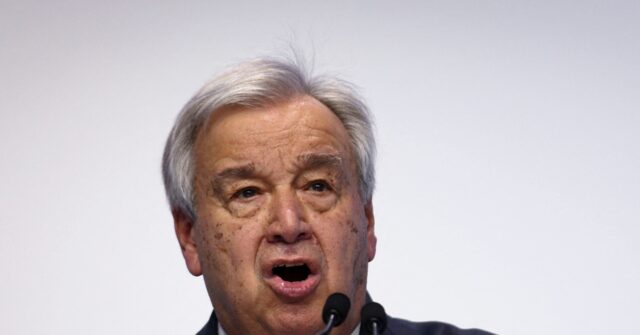United Nations Secretary-General Antonio Guterres has recently called on governments worldwide to implement a global censorship framework aimed at combating hate speech and disinformation proliferating online. He articulated his concerns about “unchecked digital platforms” exacerbating the “worst impulses of humanity” and endangering global stability, urging states to engage with U.N. initiatives like the “Global Digital Compact.” Launched in June 2023, the Compact seeks to curb harmful online speech by establishing accountability standards for digital platforms and controlling discourse deemed threatening by the U.N. UNESCO, also active in this domain, launched a campaign to educate social media influencers about misinformation, characterizing urgent global intervention as necessary to promote compliance with U.N. standards.
At a recent U.N. Alliance of Civilizations global forum held in Portugal, Guterres reiterated the importance of addressing online hate speech. He noted that misinformation contributes to harmful stereotypes and societal divisions, highlighting the need to counter growing antisemitism, Islamophobia, and anti-Christian sentiment fueled by misleading narratives. Guterres pointed to the rapid dissemination of hate speech facilitated by artificial intelligence technologies and proposed that countries adopt U.N. initiatives to address these digital challenges. The Global Digital Compact aims to create a regulatory framework for ensuring the integrity and safety of information shared online, especially during critical periods like elections.
Guterres expressed the urgency of this mission at the Alliance meeting, advocating for cooperative global governance amid rising tensions and divisions among people. He emphasized humanity’s shared fate over individual differences, aligning this perspective with the United Nations’ broader goals for peace and stability. Meanwhile, UNESCO highlighted its role by calling for prompt measures to enhance media literacy and fact-checking skills among content creators, emphasizing the importance of responsible information dissemination in fostering public trust in media.
To bolster its campaign against misinformation and disinformation, UNESCO is developing targeted initiatives, including programs tailored for influencers and other social media users. The urgency for improved fact-checking practices, as cited by UNESCO, aims to rectify the prevalent issues of misinformation that threaten public discourse and informed decision-making. Through these educational efforts, the organization hopes to equip social media influencers with the tools necessary for recognizing and combating misleading narratives, underscoring the critical role they play in shaping public perceptions.
A significant component of these efforts emerged during the recent G20 summit, where Guterres and Brazilian President Luiz Inácio Lula da Silva collaborated to promote a “Global Initiative for Information Integrity on Climate Change.” This initiative is designed to tackle misinformation that undermines climate action, highlighting the decision-makers’ recognition of disinformation’s potential to obstruct vital global challenges. Lula’s administration has faced criticism for implementing censorship measures, and he continues to push for comprehensive international cooperation against the proliferation of disinformation as part of this broader agenda.
In the concluding remarks from the G20 summit, the importance of transparency in digital platforms was underscored, with agreements reached on the need for responsible practices in response to the identified threats of misinformation and hate speech in the digital age. The joint declaration affirmed a commitment to collaborating with relevant stakeholders to develop and implement effective policies to enhance information integrity and counteract the significant impacts of disinformation on society. The ongoing initiatives from Guterres, UNESCO, and global leaders reflect a concerted effort to create a more secure and truthful digital landscape as a foundation for informed public engagement and social cohesion.

